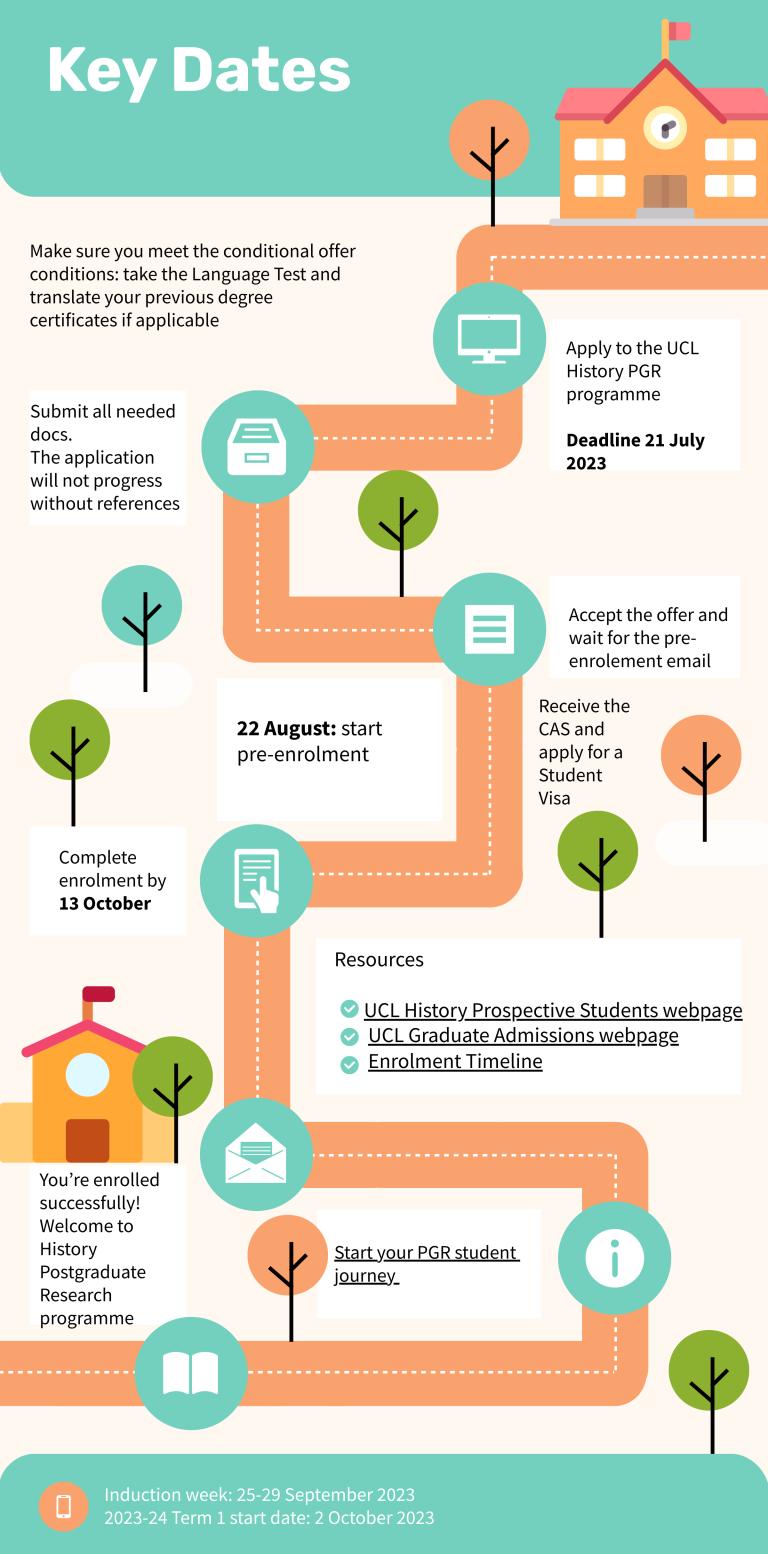This page is designed to give you the information you need to support a successful application to the History MPhil/PhD programme. Take the time to read it carefully before making your application.
- Deadlines
Applications for the 24/25 academic year are now open.
The department operates two deadlines for applications each year. The deadlines for admissions in the 2023/24 academic year are as follows:
- Wednesday 3th January 2024: This is the deadline for all students who wish to apply for funding through UCL
- Friday, 31 May 2024: This is the final UCL deadline for applications. No new applications for September 2024 entry will be considered after this date.
Please note that we accept applicants for September entry only.
- Entry requirements for postgraduate research
You should normally have a first- or upper second-class honours degree or an equivalent qualification and have performed well in your MA degree programme. In normal circumstances, we do not accept candidates without an MA degree. Those applying from overseas should have achieved high grades, especially in the modules or subjects relevant to their research, and should attach a certified official transcript to their application.
Students whose first language is not English will need to provide evidence of their capacity to research and write in English. You are expected to have what is termed 'Advanced' level English.
Further details regarding entry requirements and English language requirements can be found on the course details page.
- Identifying a supervisor
In order to study at UCL History you will need to identify a suitable supervisor for your proposed research. Your first step should be to review the list of academic staff members given on the People section of this website. You will notice that staff are listed by geographical area and by the historical period on which they work. Every staff profile page includes information on the types of PhD projects that the academic is willing to supervise. Take time to look carefully and identify the person whose research interests match most closely with your own.
Once you have identified your preferred supervisor, we recommend that you contact them directly. Tell them a little bit about yourself and give them an outline of your proposed research (this should be between 300 - 500 words in length). Ask them whether they would be willing to supervise your work. They may require a more substantial writing sample, as well as ask you to think of who would be a suitable second supervisor (from within the department or beyond).
Please do not contact potential supervisors unless you have a relatively clear idea in mind of the work that you wish to do. If in doubt or if you need help identifying a potential supervisor, you may contact the postgraduate tutor, Professor Jason Peacey.
- Drafting your research proposal
You should have a short draft of your research proposal in hand before you contact your preferred supervisor. This should be approximately 300 - 500 words long. Your formal application will include a longer proposal of 1,000 - 1,500 words.
The quality of your final research proposal is essential to a successful application, particularly if you wish to be considered for funding. As such it is strongly recommended that you contact your potential supervisor early in the academic year in order to obtain their advice on your proposal so that you can refine it before you submit your application. In most cases, your proposal will go through several drafts. You should discuss it with your academic advisors at your home institution as well as your chosen supervisor here at UCL and identify the problems that your thesis might be able to solve.
You may find it helpful to consult this document on 'How to Write a PhD Proposal' (pdf), written by current and previous UCL graduate tutors.
- Application materials
In addition to your formal research proposal of 1,000-1,500 words, your system application must include two academic references, from people able to comment on your suitability to undertake the research you propose. You will also be asked to supply certified transcripts of your undergraduate and MA grades (if complete).
The central application system might request you upload a personal statement as well.
- What is the MPhil?
All successful applicants to the History research degree programme will initially be registered for the MPhil degree. If your studies progress as planned, then you will upgrade to the PhD degree during your second year of full-time (third or fourth year of part-time) study. You can read more about the upgrade process here. Essentially, you will be required to submit paper materials including a draft chapter and outline of your planned research; to give a presentation on your work to an audience of your peers; and to be vivaed by four academic staff (including your supervisor) on the work that you have submitted. If the upgrade team agrees that your work is progressing to the expected standard then you will be moved onto the PhD track. Those who are unsuccessful in the viva after two attempts may decide to pursue an MPhil degree instead. This would usually be completed in two or three, rather than three or four, years, and involves a dissertation of up to 60,000 words instead of the PhD dissertation of up to 100,000 words.
UCL Term times 2023-24
Key Dates (enrolment)

download as PDF:
 Close
Close

